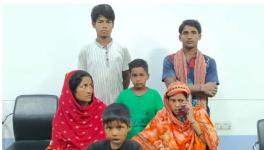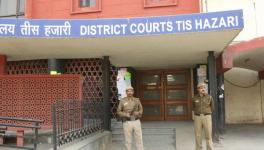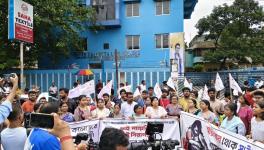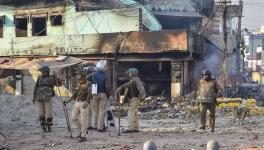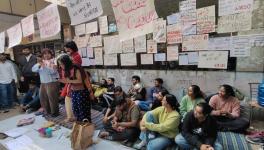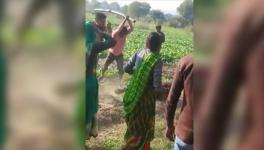A Dalit Family’s Battle for Justice and Dignity in the National Capital
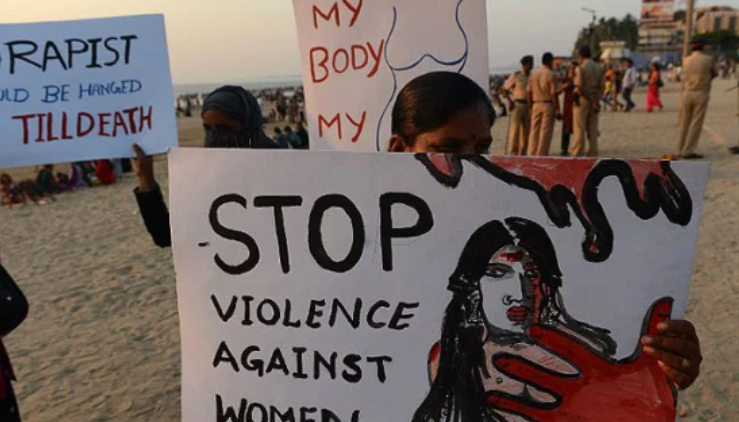
Image for representational use only; Image Courtesy : AFP
Rita* is surrounded by a few young men and women in Meerabai Park in North Delhi’s Kalyan Vihar. These young men and women, affiliated with different students’ organisations, have come to express their solidarity with Rita in her fight for justice for an incident which has claimed the life of her adopted daughter Seema*.
Recently, Seema was found hanging in a house in upscale Model Town area where she had just begun working as a full time domestic helper to an elderly woman. Delhi Police, in its investigation, found that the girl had died due to asphyxia and it was ‘suicidal in nature’, but it did not register any FIR in the matter. However, Rita is certain that her daughter was raped and murdered.
Rita’s story is an example of what happens when the poor seek for justice. She came to Delhi from Basti district of Uttar Pradesh with her husband, Ramesh*, in 2004 in search of livelihood. Hailing from a family of boatmen belonging Nishad community, a scheduled caste in Northern India, Rita lives with her family of seven in her 10x6 room in North Delhi’s Rajpura Gud mandi near Delhi University. She and her sister work as domestic helpers in nearby areas to sustain their livelihoods. Her husband lost his job as a plumber during the nationwide lockdown due to the pandemic. Her daughter, Seema, had also joined the same work but had taken a break after working for few months in Rajouri Garden.
Seema was later shifted to another home in the Model Town colony where the employer was an old lady who promised her a monthly salary of Rs 11,000. But just a week later, she was found hanging from the ceiling in the driver’s room at her new workplace.
Rita had adopted Seema after her sister had died and her alcoholic husband had no interest in raising the children. The family had decided that every brother and sister will take responsibility for raising the three children.
Narrating the episode of Seema’s death, Rita told NewsClick, “I got a message in our WhatsApp group that a family needed a domestic helper. So, we went to meet Renu Mittal, the employer’s daughter, who lives in Kamla Nagar to discuss the work. After the discussion, Seema joined the work on September 28. I had briefly talked to her on October 1, 2 and 4. The employer had few complaints regarding the work. I assured her that she would easily learn it. The employer ensured that she would talk to family members in her presence only.”
Also read: DUJ “Shocked” at Delhi Police Assault on Caravan Journalist, Calls for “Exemplary” Action
She added, “On October 4, we received a call from employer to take our daughter back. Soon, Renu Mittal came to us and took me to her mother’s house. She told me to cite the age of girl as 19 instead of 17. When I reached the house, I saw the house was teeming with a fleet of policemen in uniform as well as plain clothes. They asked me about her credentials, her age, who we were. I repeatedly asked them to allow me to meet my daughter. They said they would soon allow me. Few hours later, I was told to meet her but not to touch her or any belonging in the room. This sentence alerted me. When I saw her, she was standing with her back on my side but when I looked at her face, she was hanging from the ceiling. There were burn marks on her hands too. I started crying. I was rushed out of the room.”
“Later, the police officials told me that my daughter had killed herself. I could not believe it. I still do not believe it. Why would a happy girl like her take such an extreme step? I had constantly asked her if she had any problems and she always said she was fine. The strangest thing about the incident is that she was found hanging in the driver’s room. Why would she [employer] send her to driver’s room when the employer knew that she was a girl?,” Rita questioned.
However, the real ordeal began only after the incident. She said, “Police took the dead body to an unknown place whereas we were brought to Model Town Police Station to record our statements. We were made to sit till 2 o’clock in the night but they did not reveal the whereabouts of the dead body. Seema did not have any Aadhaar card or any identification card. The police official asked us about the proof of our relationship. They said only the father of the deceased would be allowed to see the body or else the body will be marked as ‘unidentified’ and will be treated accordingly. The father had been drug addict and remained untraceable. Even her sister was refused for identification.”
Talking further about the attitude of the policemen as well as the deceased girl’s employers, she added, “With no option left, we went to the employer’s house on October 7 to find out tge whereabouts of the body. The attitude of the employer irked us and we pelted stones and broke pots. The lady called the police and we were detained. The policemen took us to the police station and started beating us mercilessly. They beat one of my family members so badly that he almost stopped breathing. When we pleaded, the policemen said that they ensure that we flee from Delhi and our children will be taken care by neighbours.”
Three days later on October 8, when Seema’s father finally arrived from Bahraich, the body was identified and sent for post mortem, she said, adding that even then, police did not reveal where the body was taken for post mortem. “We came to know about the place from the people outside the mortuary. We were asked to go to the crematorium. We resisted the move. We told them explicitly that women do not go to cremation ground in our tradition but they did not relent. The policemen cremated the body at Wazirpur Crematorium,” Rita said.
Even though they had requested for a fresh probe into the case as they were not satisfied with the investigation, their request have been rejected, she alleged, adding, “We pleaded to police officials and made it clear that our girl could not die by suicide. Still, no police official has interrogated the employer or her son and drivers. No sane person can understand the silence of the police officers.”
Ashutosh Kumar Mishra, a member of Lawyers Against Atrocities, who has been helping the family members legally, told NewsClick that the police did not follow the protocol under Indian Penal Code.
He said, “Under Indian Penal Code, the police is directed to register the case under section 166 A for any sexually cognisable offence. The police did not do it. Similarly, the post mortem should have been done within 24 hours but it was delayed to four days. Now, you know even if there was any fluid on the body at time of crime, it may no longer exist for four days. I got the post mortem report assessed by independent doctors and they are suggesting that it was not conducted from the angle of rape. The biggest fault remains about the cremation of body. Why did police cremate the body? Certainly, Hathras was repeated in Delhi. If there was no rape, it would have certainly been highlighted in another report. We are awaiting for viscera report and will proceed accordingly.”
Following this, the victim’s family members and students’ organisations including Bhagat Singh Ekta Manch, Krantikari Yuva Sangathan, All India Students’ Association and Students’ Federation of India protested outside the Model Town PS on October 16. However, the police detained them and booked them under Epidemic Act, Disaster Management Act and other provisions of Indian Penal Code for criminal conspiracy. The organisations, in their collective statement, have demanded immediate registration of FIR against the accused under relevant sections of IPC and SC/ST (Prevention of Atrocities) Act. They have also demanded action to be taken against the police personnel involved in committing procedural lapses and forceful cremation of the victim's body.
Sitting tired and restless in her tiny room, Rita finally said, “I never thought this would happen to us. I never forced her to work. Even when she started working, I thought that I would make jewellery for her marriage from the saved money. Now, she is gone.”
But she is also determined to fight for justice, as she said, “Even though they tried to frighten us, we are not afraid. We have been treated in this manner because we are poor dalits. But they are forgetting one thing, poor also have rights. We will claim it.”
*The names of the family members have been changed to protect their identities.
Get the latest reports & analysis with people's perspective on Protests, movements & deep analytical videos, discussions of the current affairs in your Telegram app. Subscribe to NewsClick's Telegram channel & get Real-Time updates on stories, as they get published on our website.











